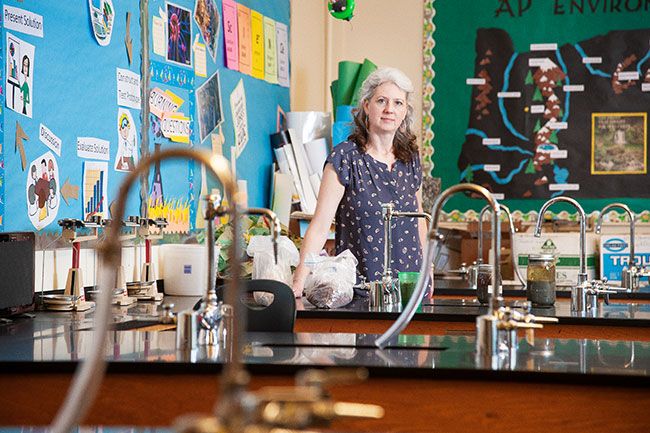For McMinnville science teacher, extra training worthwhile

Science teacher Laura Syring is one of several McMinnville High School educators to have taken additional training to teach the rigorous, college-level courses in the Advance Placement and dual credit programs.
For several years, she has been offering a year-long environmental science class in which students earn both high school and college credit. This year she has added a biology course that carries dual credit through Mac High’s partnership with Chemeketa Community College.
Syring attended an AP Institute and refresher courses to qualify to teach advanced classes. She connected with AP teachers from other districts and learned about new tools for teaching her students.
The additional time and effort on her part was well worth it, she said.
“I’ve always been passionate about my subject, and I want to share that with others and spur more people to care about science,” she said. “I especially want to share that with students, who will be in a position to make a difference.”
[See also: Challenges, career programs encourage students to continue]
Students who enroll in advanced classes usually have an inherent interest in science, she said.
“My topics are so relevant to life,” she said. “Students want to know how human actions affect the globe, and about biodiversity or how they choose how to have less of a carbon footprint.”
In the dual-credit biology course, she said, students complete a culminating project and analyze it in a term paper that ties their work to the core concepts they’ve been learning. Their projects often involve engaging in citizen science, picking up garbage or volunteering to plant trees or native flora.
Syring also encourages students to make real-world connections in chemistry and other courses. It leads to conversations about climate change, carbon footprints and plastics in the ocean.
She misses having those conversations directly with her students. Online, she doesn’t even see their faces all the time; high school students are often shy about turning on their computer cameras, she said.
She’s hoping to be able to teach a course, such as AP environmental science, through the Limited In-person Instruction program this spring. Students are interested, too.
“It would be so great to get LIPI so we could do activities,” she said.
In one lab experiment, students use chemicals to simulate the effects of acid rain. It’s a powerful lesson, she said, “so different than just looking at numbers.”











Comments